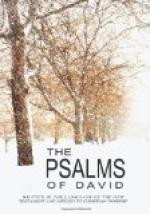I have mentioned his treatises of Theology as distinct from his other productions: but the truth is, that whatever he took in hand was, by his incessant solicitude for souls, converted to Theology. As piety predominated in his mind, it is diffused over his works: under his direction it may be truly said, Theologiae Philosophia ancillatur, philosophy is subservient to evangelical instruction; it is difficult to read a page without learning, or at least wishing to be better. The attention is caught by indirect instruction, and he that sat down only to reason, is on a sudden compelled to pray.
It was therefore with great propriety that, in 1728, he received From Edinburgh and Aberdeen an unsolicited diploma, by which he became a Doctor of Divinity. Academical honours would have more value, if they were always bestowed with equal judgement.
He continued many years to study and to preach, and to do good by His instruction and example: till at last the infirmities of age disabled him from the more laborious part of his ministerial functions, and being no longer capable of public duty, he offered to remit the salary appendant to it; but his congregation would not accept the resignation.
By degrees his weakness increased, and at last confined him to his chamber and his bed; where he was worn gradually away without pain, till he expired, Nov. 25, 1748, in the seventy-fifth year of his age.
Few men have left behind such purity of character, or such monuments of laborious piety. He has provided instruction for all ages, from those who are lisping their first lessons, to the enlightened readers of Malbranche and Locke; he has left neither corporeal nor spiritual nature unexamined; he has taught the art of reasoning, and the science of the stars.
His character, therefore, must be formed from the multiplicity and diversity of his attainments, rather than from any single performance; for it would not be safe to claim for him the highest rank in any single denomination of literary dignity; yet perhaps there was nothing in which he would not have excelled, if he had not divided his powers to different pursuits.
As a poet, had he been only a poet, he would probably have stood high among the authors with whom he is now associated. For his judgement was exact, and he noted beauties and faults with very nice discernment; his imagination, as the Dacian Battle proves, was vigorous and active, and the stores of knowledge were large by which his fancy was to be supplied. His ear was well-tuned, and his diction was elegant and copious. But his devotional poetry is, like that of others, unsatisfactory. The paucity of its topics enforces perpetual repetition, and the sanctity of the matter rejects the ornaments of figurative diction. It is sufficient for Watts to have done better than others what no man has done well.
His poems on other subjects seldom rise higher than might be expected from the amusements of a Man of Letters, and have different degrees of value as they are more or less laboured, or as the occasion was more or less favourable to invention.




